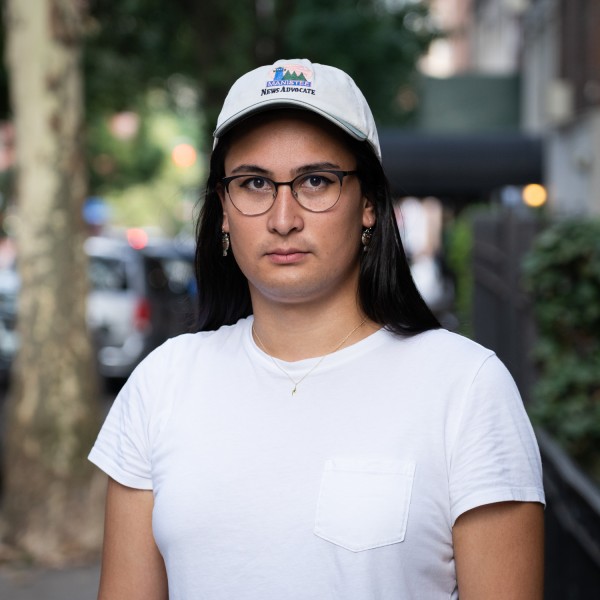Hi everyone!
This week, we published a special issue that, apart from being beautifully presented and well-written, also represents several new undertakings for WSN.
It’s a project led by our Identity & Equity section, a relatively new division of our Culture desk. It’s a new angle for a Culture special issue, which is usually the fashion-based “Fringe.” And it features some of our most original web design ever, a big step in our transition from print to online publication.
Check it out at the links below, and keep reading to learn more about when we might talk to a source off the record.
|
|
|
"Re:" The Identity & Equity Issue
|
|
WSN’s 2022 Identity & Equity special issue explores heritage and lived experience and the role they play in shaping personal identity. A collaboration between WSN’s Culture desk and our Under the Arch magazine, “Re:” addresses inequality and the ways that it shapes us. In this issue: |
|

|
|
NYU provost Katherine Fleming has been appointed the president and CEO of the Getty Trust, a multi-billion dollar California-based trust fund. A new provost has yet to be appointed. (Staff Photo by Manasa Gudavalli)
|
|
|
Notable hirings and departures
|
|
NYU provost Katherine Fleming will leave NYU for the J. Paul Getty Trust in August. She was selected on Tuesday as the next president and CEO of the trust, which oversees the Getty Museum and other Los Angeles-based Getty institutions.
Daniel Mulhall, Ireland’s ambassador to the United States, will step back from a 44-year diplomatic career to be a professor of Irish studies at NYU in the fall 2022 semester.
The next dean of NYU’s Gallatin School of Individualized Study will be Victoria Rosner, currently a Columbia University administrator. |
|

|
|
The newly reopened Grey Art Gallery features art on display for the NYU community. (Staff Photo by Camila Ceballos)
|
|
In its first exhibition since the onset of the COVID-19 pandemic, the NYU-exclusive Grey Art Gallery presents an archival collection of pieces ranging from Warhol Polaroids to recent works from Middle Eastern artists.
The right-wing organization Turning Point USA, which is itself associated with misinformation and dark money, claimed that several NYU professors promote radical leftist propaganda.
NYU’s Swipe it Forward meal swipe donation program is a good idea that deserves a better implementation, Holly Kase writes in our Opinion section. |
|
There are four main types of ground rules for journalistic interviews: from least to most restrictive, on the record, on background, on deep background and off the record.
Here’s how Indira Lakshmanan defined the terms in a 2018 piece for the Poynter Institute, a journalism nonprofit (emphasis mine):
“On the record” means you can use your information and name and quote your source. “On background” means the source doesn’t want to be named, but is willing to be identified as a “White House official,” “State Department official,” “Senate aide” or whatever. “On deep background” means you can report the information, but you can’t cite where it came from, which poses a challenge for news organizations with high standards of sourcing. “Off the record” means you can’t report it.
Specific definitions of these agreements vary widely, but Lakshmanan’s definitions reflect the general understanding. What’s more important than an industry consensus, though, is that a journalist and their source agree on the terms of their conversation. Regardless of the wording, both parties need to be on the same page.
At any rate, WSN reporters speak with sources on the record in all possible circumstances. In the vast majority of cases, there’s no reason that would justify anonymity or going off the record.
“Transparency is critical to our credibility with the public and our subscribers,” the Associated Press writes in its guidelines for using anonymous sources, and allowing sources to request anonymity without good reason compromises that credibility. If you’re not willing to put your name to the information you’re giving, why should we put ours to that information when we publish it?
The exceptions are in cases where personal safety or employment status could be compromised if someone’s name is associated with certain information in print.
If someone could lose their job or face harassment by talking with us on the record, we have no problem granting anonymity or speaking off the record, especially if we can’t get that information any other way. We would be unlikely to publish a story based only on anonymous information, but we’d rather miss out on a scoop than get a source fired.
One mutually beneficial context for an off-the-record conversation is clarifying information that can’t be freely discussed on the record. If there are things someone cannot be quoted as saying without fear of reprisal, listening to them off the record can be invaluable even if specific facts cannot be printed.
The way information is presented is often as important as what information is included. So by allowing people to speak freely, we can sometimes make better-informed decisions about how to frame an article — even if we can’t say why.
This segment was inspired by a handful of off-the-record and on-background sources I’ve talked with in the past week, so if you’re one of those people, don’t worry — this wasn’t about you specifically. For everyone else, you’ll just have a slightly better idea of what might be going on behind the scenes the next time you wonder about our sourcing.
Thanks for reading Editor’s Note. Until next week,
—the editor
|
|
|
|
